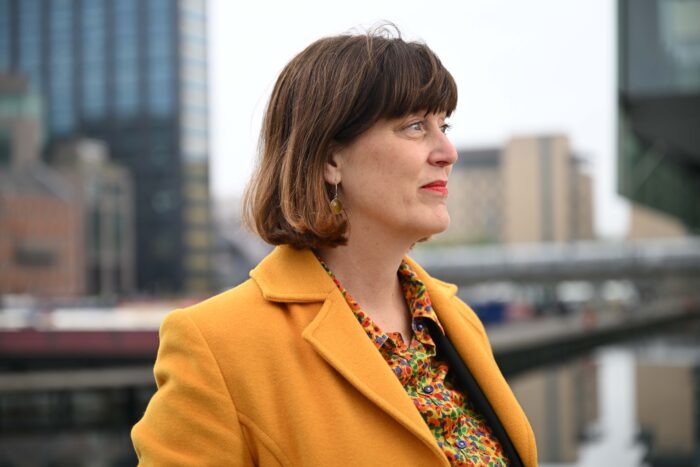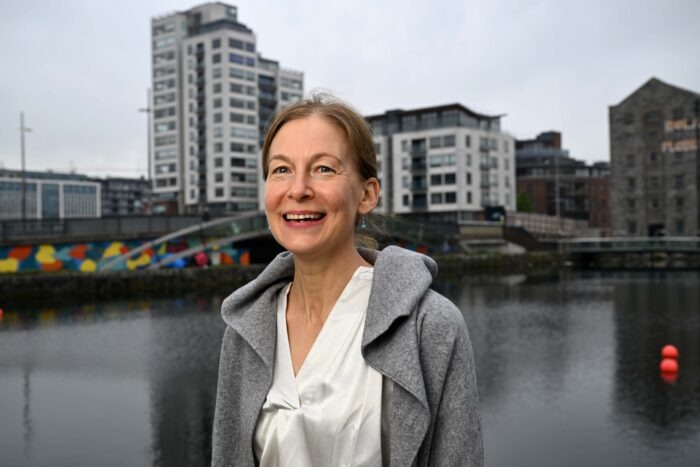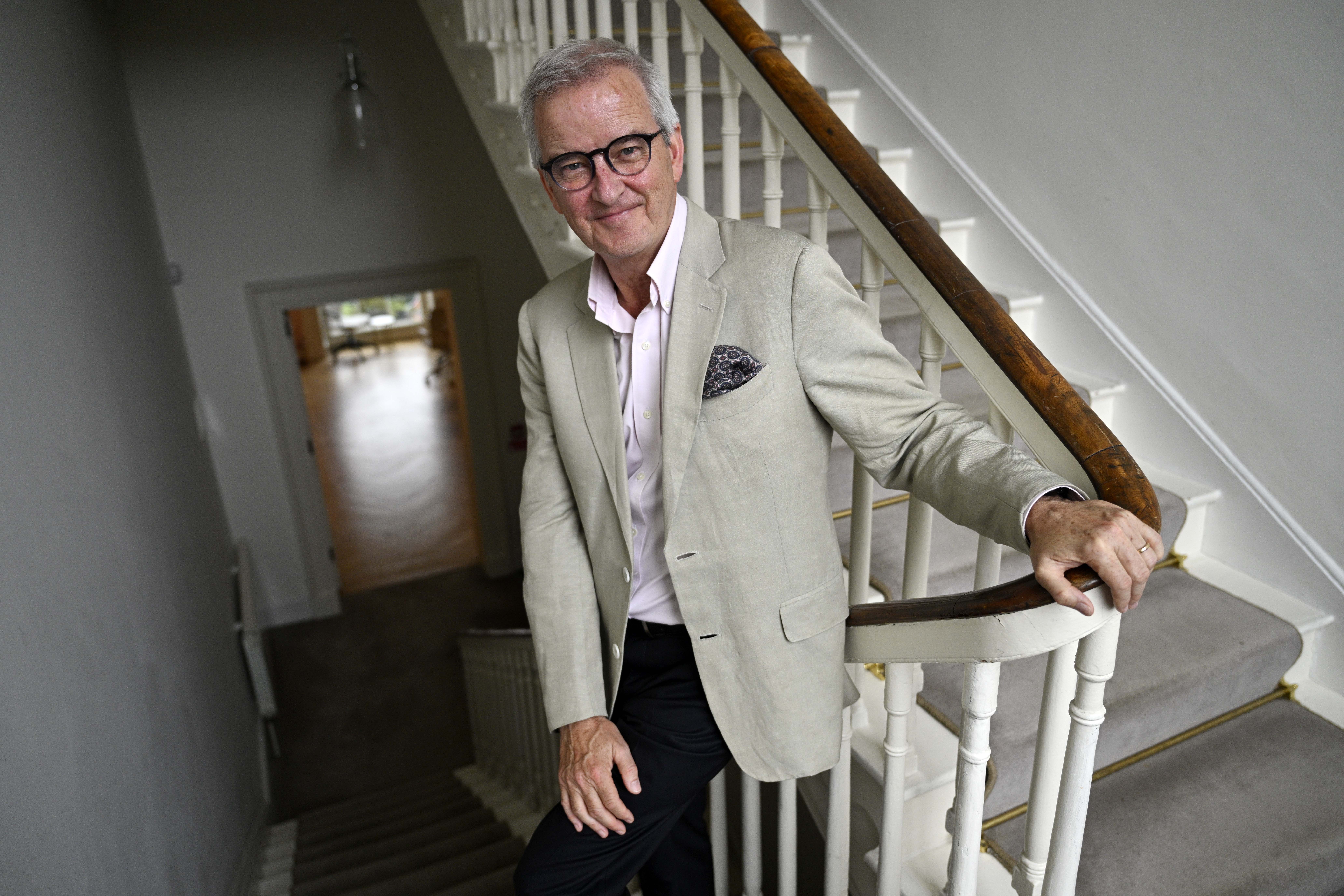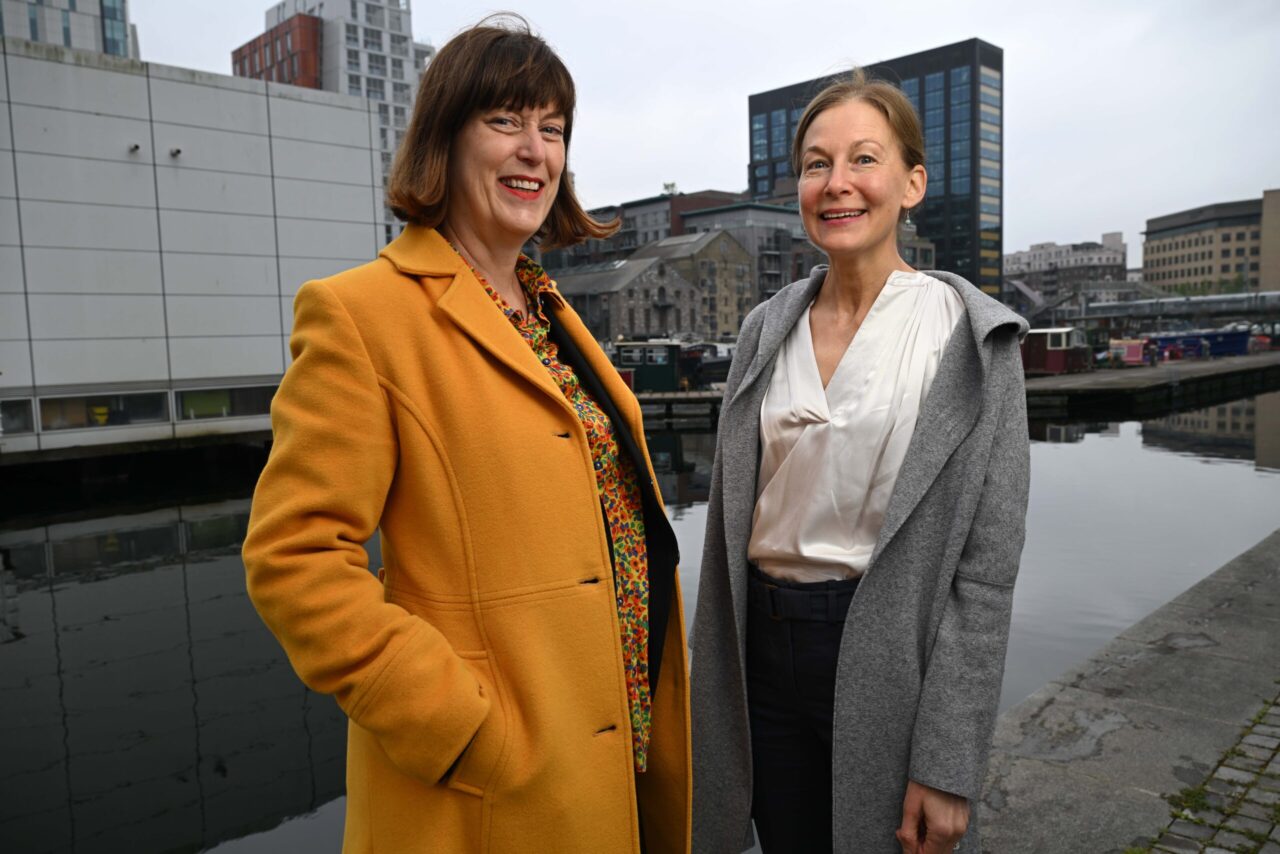Deirdre Mortell and Helene Hugel greet each other like old friends.
Mortell is the chief executive of Rethink Ireland, an organisation that has raised €109 million to invest in funds backing big ideas in education, health, social enterprise, equality, and the green transition.
She has an impressive pedigree, with 20 years of experience as a pioneer in investing in non-profits in Ireland as co-founder of the One Foundation, a philanthropic venture fund backed by Declan Ryan, and with stints as a senior executive with Barnardos and Oxfam.
Hugel’s face lights up when she sees Mortell, whom she first met seven years ago. The founder of Helium Arts, a national children’s art and health charity, Hugel, an artist and a skilled puppeteer, has worked as a clown in children’s hospitals. She set up Helium Arts in 2009 after she became convinced that art and creativity can help children with long-term health issues.
Working with Rethink Ireland has allowed Helium Arts to multiply in size and help thousands of children, Hugel tells me.
But, as we head into a meeting room in the Design Tower near Grand Canal Quay in the Trinity Technology & Enterprise Campus, she tells me her plans are much bigger.
The story so far
The seven-storey Design Tower, built as a sugar refinery in 1862, is where Rethink Ireland is based. Its architecture is of the old Dublin, but it looks out upon the new cityscape also — Google’s Barrow Street complex glistens in the sunlight across the still water of the docks.
Over the next hour, our conversation covers a lot of ground as we delve into the work of Rethink Ireland and also Helium Arts, a non-profit whose growth in recent years is emblematic of how growth capital, backed by the private sector and the Irish government, can create new social innovations to tackle important Irish social issues.
After finishing her decade-long job leading the One Foundation, Ireland’s first venture philanthropy fund, Deirdre Mortell took some time out. The foundation had invested in core areas like mental health, social entrepreneurship, and the integration of minorities — in Ireland and Vietnam.
It made a big difference but, from the start, it had been mandated with a limited lifespan: Before being wound up in 2013, it had to act with urgency. Mortell had seen how this approach had made a difference, and how it met a need.
In 2014 Rethink Ireland was created by government as a non-profit growth capital fund, to back big thinking and impactful ideas. Its first break came when the Department of the Environment agreed to match any funds it raised, up to €250,000. “We very quickly did and from there we built momentum,” Mortell said.
By January 2016 Rethink Ireland was ready for its official launch by the then Taoiseach Enda Kenny. Its mission was to stimulate philanthropy and support innovative non-profits.
The first Rethink fund was called Animate, and focused on using small seed grants to give non-profits the capital to try new things. “It was typically less than €10,000 each and it includes projects like ReCreate Ireland, a circular economy project in Dublin, and CareBright, Ireland’s first dementia-friendly living facility in Bruff, Co Limerick,” Mortell said.
The success of the Animate fund led to Google investing €500,000 in Rethink Ireland. “It was a really significant milestone for a very young organisation,” Mortell said. “This was again matched by the Department of the Environment.”
It created a €1 million fund called THINKTECH, targeting tech-based solutions to solve critical social issues in Ireland.

“With that, we were able to really start growing much more quickly,” Mortell said. “We backed FoodCloud and helped it build its early technology.” FoodCloud reimagined food waste by redistributing surplus food not just feeding people but also reducing food loss and waste.
Rethink Ireland also backed other initiatives like iScoil, a non-profit online learning service giving young people a pathway to learning, accreditation and progressing with their lives. “iScoil is for young people who can’t attend school, whether it is because of social phobias, mental health issues or exclusion. It is for people who want to learn. It has gone on to scale quite significantly,” according to Mortell.
“From there we really built momentum,” Mortell said. “We won over corporate donors and we also started to bring individual and family donors on board as well.”
Mortell and her close-knit team knew how hard it was for deserving nonprofits to raise growth capital to expand their capacity as organisations — not just to deliver better outcomes for the people they served, but also to make themselves more sustainable.
“One of our key innovations was to support non-profits to better fundraise for themselves,” Mortell said. “So our Education Fund, which was a €7 million fund launched in 2017, enabled education initiatives that had the capacity to raise their own funds. If they met all of our criteria, we would match their funds. And that enabled us to really scale quite significantly, quickly.”
As Rethink Ireland grew it set its own targets. It initially hoped to raise €5 million, but as it built on its success, it started to think bigger.
“We set a goal to raise a hundred million by the end of 2023 and when we crunched the numbers we discovered we had surpassed it by nine per cent,” Mortell said. (It will mark this achievement with an event this Thursday hosted by Family Business Network in partnership with The Currency.)
Investing this amount of money required Rethink Ireland to assemble an experienced team which has worked in both business and social enterprises.
Its chair is serial entrepreneur Áine Kerr and non-executive directors include Adam Harris, the founder of autism charity AsIAm, Vickie Wall, a partner with EY, former banker and chair of the Rise Foundation Lassie Mulligan, and Declan Black, the former managing partner of Mason Hayes & Curran.
Unlocking potential in young people
The impact of Rethink Ireland’s investments is a multiple of the money it puts in. There are two definitions of success, according to Mortell. “One is when the organisation scales by traditional methods. The other way we think about it is through system change.”
Mortell said that the growth of Helium Arts is an example of scaling. “They are helping more children, and they are in more locations,” Mortell said.
The Trinity Centre for People with Intellectual Disabilities, run by Prof Michael Shevlin, is an example of an organisation that Rethink Ireland supported in changing how Ireland does things.
“They’re the first in Ireland to provide access to third level education with qualifications for people with intellectual disabilities,” Mortell said. “We put in €2.83 million over six years through two different funds from 2017 until we exited about six months ago.”
We’re providing multi-year commitments but some of that is performance-based money, so it’s not without its conditions.
Deirdre Mortell
The centre is now bringing its own funding from some of the world’s largest companies including AerCap, Ryanair and LinkedIn. It works with relatively small numbers of people but the impact it has on their lives is immense. The centre has now teamed up with other third level institutions to form the Inclusive National Higher Education Forum.
“This started out being a co-learning group but over time it became an advocacy group,” Mortell said. “They persuaded the then minister for further and higher education, Simon Harris, last year to embed for the first time €10 million in the budget to support young people with intellectual disabilities to go to any of ten higher education institutions in Ireland.
“So instead of being just something in Trinity that was helping 20 young people, there are now 10 higher education institutions that will be funded to put this programme in place.”
Five core areas
Rethink Ireland focuses on five areas: educational disadvantage, health, green transition, scaling social enterprise, and equality. In total it has raised 58 funds targeting aspects of these different areas.
It works with philanthropists and companies in each of these areas. It has also received matching funding from the state including the Department of Rural and Community Development through the Dormant Accounts Fund.
AIB, Google, Bank of America, the Medtronic Foundation, and Mason Hayes & Curran are among its corporate partners. Families and individuals are also supporters including Dubliner Peter Kinney and his wife Lisa Sandquist who backed a €10 million Equality Fund in 2010.
It also works with multiple partners on a pro bono basis including CONNECT, Broadlake and Arthur Cox. This diversity of supporters has allowed it to help more than one million people and hundreds of non-profits and social entrepreneurs.
“Many non-profits can raise their own six-month and one-year project-based money,” Mortell explained. “But what they find really hard is getting growth and capacity-building money which takes many years.
“We feel that’s uniquely what we can offer the market. We’re really looking for partners who want to see much more impact, and that’s really only possible through usually three to five years commitments.”
Rethink Ireland can help transform an organisation, but Mortell acknowledged that this can take time. “It’s really using our venture philanthropy model. We’re providing multi-year commitments but some of that is performance-based money, so it’s not without its conditions,” she said.
“We’re trying to give an opportunity to learn how to grow by providing expertise and also co-learning accelerator programmes. We never just give money.”
Business people like investing through Rethink Ireland because they understand how it works, Mortell said.
“They totally get it,” she said. “They’re entrepreneurs. They’ve been through their own journeys so they know how helpful support is in this way.”
Measuring success, the green transition
Rethink Ireland invests in collecting evidence to measure its impact. Mortell said it was one of the organisation’s “key strengths” and that it was “strongly data-driven”.
I ask how Rethink Ireland measures its own success. “We know that up to the end of 2023 we’ve touched the lives of over a million people, through all of our awardees,” Mortell said.
“We’ve backed 448 innovations in every county in Ireland. We’ve launched 58 funds. A fund would be something like THINKTECH or the education fund or the growth fund. So, that’s essentially a call for applications around a particular issue.”
Mortell said that Rethink Ireland has invested in non-profits that have created 998 jobs and supported 3,309 people in employment.
“Overall, we have supported many people, some of whom were very far from the labour market,” Mortell said. “That includes lone parents, refugees and asylum seekers, people with disabilities, people who might have found it difficult to get a job otherwise.”
Rethink Ireland’s purpose is not job creation, but creating these jobs is part of what it does. Mortell believes that social enterprises can change Irish society and deliver better services to people.
I knew there was a deeper way of using my art form, but I wasn’t quite sure what it was.
Helene Hugel
“Imagine if we could turn that model on its head and take social enterprise seriously as a business model in this country,” she said.
The green transition is another big area of focus for Rethink Ireland. “There are lots of small local projects doing local things but together they all add up,” she said, adding that Rethink Ireland has backed seven funds like the Sustainable Cork Fund, a 2019 to 2020 fund that invested €200,000 in partnership with the Cork Chamber of Commerce and the State to support sustainable initiatives.
The Urban Uplift Fund is another example that invested, over two years, €763,000 in partnership with JP Morgan Chase, IBM and the Department of Rural and Community Development to support young adults to develop skills in the green and digital sectors.
“In Skibbereen, Co Cork we have paint recycling. In Dublin we have bicycle recycling,” Mortell explains. “In Ballymun we have our National Centre for the Circular Economy. We have GIY, Grow-it-Yourself, which we have backed significantly and are now looking to build a school garden in every school in Ireland. Ireland has the bones of a community infrastructure to support the green transition”
“Small actions can drive big changes in behaviour,” Mortell said. “Even our heads of industry live in homes and can take small actions with their families, and I think that’s one of the reasons why we see grandchildren and children influencing parents and grandparents in big ways.”
A talented puppeteer with a mission to help
Helene Hugel’s first exposure to how artists could help sick children was in CHI at Crumlin, Ireland’s largest acute paediatric children’s hospital. She loved working with children but she wanted to do more.
“I knew there was a deeper way of using my art form, but I wasn’t quite sure what it was,” she tells me.
A talented puppeteer and clown, Hugel could see how children’s faces lit up despite the chronic or acute pain they were enduring. Between 2002 and 2008, Hugel worked alone as an artist helping children. In 2009, she founded Helium Arts to provide a structure to allow more artists to work with healthcare practitioners and help more children and young people living with illness in Ireland.
The Arts Council gave Helium Arts some funding and other grants, something that allowed her to build a tiny team. When Mortell met Hugel seven years ago she could see the impact Helium Arts was having but it was struggling to grow.
“I was someone who had a big idea,” Hugel explained. “I could see the positive effect of my work in hospitals and I knew there was so much more need beyond myself.”
Hugel didn’t have access to the multi-annual funding so she needed to develop a long-term bigger vision.
“It’s very hard. You’re on the ground doing the work, trying to raise money, trying to set up an organisation,” she said. “It is piecemeal. Our funding was from year-to-year so our whole team was pretty much freelance. I could not commit to employing anybody except myself.”
Rethink Ireland started to talk to Hugel about refining her vision and figuring out how she could expand. “It was a hard process,” Hugel said. “We had to really interrogate what we were doing. We looked at where healthcare policy was going.”
Helium Health decided to focus on children with long-term health conditions as it felt that this was the area where it could make the most impact. “About 11 per cent of children in this country are living with a long-term health condition,” Hugel said.
These children have conditions like diabetes and epilepsy as well as other rarer conditions that require frequent or constant treatment. “About 30 per cent of the children we work with have rare conditions,” Hugel said. “The research shows that children living with health conditions feel very alone. They have fewer close friends, can suffer more bullying and have a poor sense of wellbeing. There can be a higher suicide incidence also.
“We support children’s long-term health conditions through the arts. It’s all around reducing social isolation and increasing well being through creativity.
“Our solution is very simple, through self-expression through the arts we bring children together.”
To do this, Helium Arts decided to help children not just in hospitals but also in the community. After fixing on this new approach, Helium Arts pitched its idea to Rethink Ireland. “We wanted to support a creative health model,” she said.

Rethink Ireland agreed to support Helium Arts for three years — not just financially but also giving it access to expertise. “We leveraged our Rethink Ireland support to raise funding from the Arts Council and a philanthropic donor in a multi-annual way,” Hugel said.
This gave it €250,000 in total to use to expand its services. However, the pandemic arrived. Having multi-annual funding, according to Hugel, allowed Helium Arts to survive.
“Any crisis can happen to a charity but this was a really big one,” Hugel said. “We used that time to test what we did and build evidence to show the impact we could have. We actually innovated during that time by working online and Rethink Ireland supported us with that too. We came out of the pandemic in a stronger place than where we began.”
This was particularly important for children with health conditions who were especially vulnerable to Covid-19. “We supported a very vulnerable group of children who are not going back to school after the pandemic ended. We needed to continue to give them online support,” she said.
“Parents were scared to let their children out of their house. Children were standing at the window looking at the other kids outside playing on the green. They would not risk going outside so we were able to help them to create on Zoom calls.”
Doubling the reach, and a vision for the arts
Helium Arts also created packages of artistic equipment. “Beautiful packs would come in the post.” Hugel said. “Can you imagine what it was like taking a ribbon off and there is an explosion of colour and happiness in the home. It is so simple but it really works.”
Helium Arts continues to teach online but it also runs activities in the community. Community classes have medical support, so it gives parents respite and a chance to go for a coffee knowing their children are being looked after.
Before it started working with Rethink Ireland in 2018, Helium Arts worked with 300 children every year. By 2022 it was 1,500. It then doubled again to 3,000 last year. Rethink Ireland has helped it unlock €1.8 million in funding over six years.
“We want to double again to reach 6,000 children by 2027, and we want to double our income,” Hugel said. “We could never have done this without multi-annual funding and non-financial support from Rethink Ireland.”
This year Helium Arts expects to raise €1 million and it wants to increase this figure to €2 million in three years. It has the evidence – an independent study showed that for every €1 invested in Helium Arts, a social value of €1.98 was returned. This ambition, to build evidence, demonstrate social value, and use it to scale, according to Hugel, was accelerated by Rethink Ireland. In 2018 it was primarily working in Temple Street Children’s Hospital. By 2022 it was in four hospitals, and it wants to expand into eight locations in hospitals and in the community.
“We want to serve in children’s communities,” she said. “Children are often travelling hours for appointments. We want to be in the community through our cultural programme.”
Since Rethink Ireland first invested, Helium Arts’ team has risen from three to 20 people, and it now supports artists in secure jobs.
Hugel said Helium Arts also wants to help the HSE and the State to develop a vision for the arts in the health service. “We’re only in the space for children, but I know there is a movement, and we have allies in the Department of Health and elsewhere who want to do this. We can see the impact it has on children who because of their health have so many doors closed to them.”
Social innovations, driving change
Deirdre Mortell said that social innovations like Helium Arts demonstrate how philanthropic funding can drive significant change. “It can make an impact in a way that is incredibly meaningful to ordinary people’s lives,” she said.
“We can see the difference it makes to children with chronic or long-term illnesses or people with intellectual disabilities. In talking about what we’ve achieved to-date with our partners it is very much a call to action for more people to work with Rethink Ireland. We have raised €52 Million in philanthropy, and made it work hard, but there is so much more we can do.
“We really think there is a lot more wealth to unlock in this country from companies and wealthy individuals and families. Ireland has long-term challenges. The state recently launched its first ever National Philanthropy Strategy for Ireland and wants to support the sector. We are inviting philanthropists to say ‘Yes’ too.”

Family business
On Thursday Rethink Ireland is launching a new report on how its funding has impacted more than one million people hosted by the Family Business Network Ireland (FBN Ireland) in partnership with The Currency. John McGrane, director general of FBN Ireland, said Irish family businesses are by their nature supportive of giving back. “In every community they hire local, they buy local and they support local,” he explained.
“So it’s very much part of our Network’s support for our member Families that we enable them to, in turn, support Rethink Ireland. It’s a super-productive channel for what philanthropy can make happen when it’s leveraged-up by great collaborations and a great co-funding model from the state.” McGrane said over 100 people are expected to attend the Rethink Ireland launch as there was great interest from family businesses to learn more.
“Philanthropy gives families in business a real-world expression of their family values and the importance of passing those values through the generations.” McGrane said the FBN Ireland was launching its own collaboration fund under the banner “ Family Businesses are Here for Good!” at the Rethink Ireland event. “Over the months ahead, we’ll work closely with Rethink to help our members learn more in this space and we’ll channel our members’ financial and other support towards new initiatives that reflect the values of family business. That’s about being innovative, productive and helping great innovators to turn support into great outcomes locally,” he said. To attend this Thursday’s event in Dublin click here.


